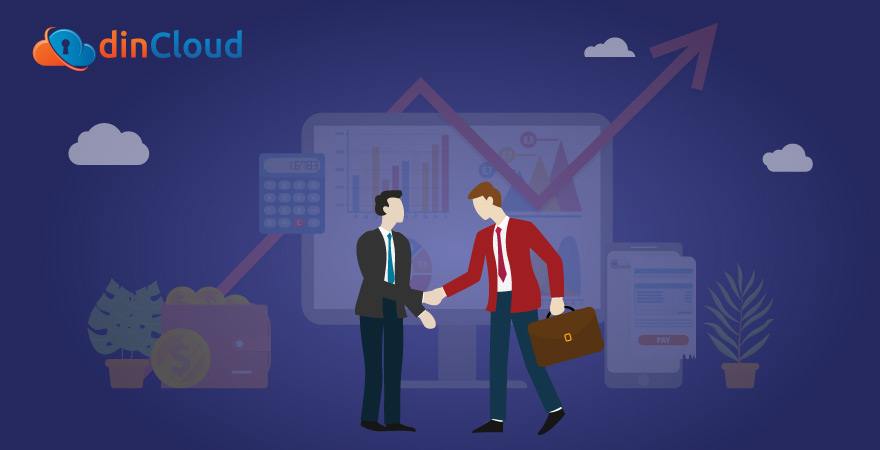Cloud Computing is rapidly getting traction in the Business to Business (B2B) transactions. Previously, Banking Industry was at the helm of affairs and things did not move as fast. Banks are all about strict checks and balances as the industry is quite heavily regulated.

However, when businesses look at this state of affairs, they do not feel this sluggishness align with their long term corporate goals. Today’s industry is all about providing not only the best service, but also in the least possible amount of time.
Also Read: 8 Reasons: Why Cloud Computing For Small Business?
This is where the inherent agility of a cloud based can do wonders. At the end of day, most businesses are serving some sort of consumer in need of a product or service. For this very reason, we are witnessing a strong emergence of fintech companies.
Well, the is one that integrates a financial service with the latest technology in such a way that it becomes a breeze to avail that service. The cloud is one of the most suitable and potent enablers for this ecosystem.
Also Read: Top 15 Advantages of Cloud Computing In 2020
Take a common example of leasing a house. It is such a lengthy and complex process that most people get frustrated with the bottlenecks. They simply lose track of what’s happening and at times, may even give up on the whole process just because of the frustratingly long waits.
What Makes the Cloud Great for B2B?
The unique features of any cloud based solution are extreme agility, scalability and flexibility. These inherent capabilities of the cloud make it a very suitable deployment ecosystem for B2B and Business to Consumer (B2C) products or services.
When a fintech company designs a B2B service, it can make instant tweaks to various parameters of the service. The other great thing about a cloud based payment model is that changes or tweaks have to be made at a central point and they take effect virtually in real time.

Instant Feedback over the Cloud
In addition to the agility of designing and tweaking a cloud based financial service, fintech companies enjoy the additional luxury of getting instant feedback about their service. This feedback come in the form of comparing the actual performance of the service with the benchmarks defined on paper for that service.
Another key aspect of this feedback comes directly from the end user of the cloud based service as at the end of day, the customer is the king. As soon as a customer realizes the convenience that a cloud based financial service has to offer, it would not only result in adoption of the solution but make it go viral.
Limitations of Traditional Banking Model
The traditional channels of delivery that are followed by banks are not as agile as the ones delivered over the cloud by fintech companies. In a traditional banking model, any financial service will have to get past a lot of bureaucratic hurdles before work can even start on designing it.
After the painstakingly long brainstorming sessions that finally accord the green signal to start work, begins the even longer process of designing such a financial product or service. Another key challenge in traditional banking channels is the top priority that is given to security.
This by no means implies that security is or should not be a priority in a cloud delivered financial product but over the cloud, what gets the central attention is the end user or consumer’s experience. The pivotal success factor in a cloud based financial service is agility.
Integrating the Cloud with B2B Models
Most such companies want to rid themselves of the sluggish traditional banking channels and adopt something agile that is delivered over the cloud. It is because they have the requisite financial resources at their disposal. What they lack is an effective delivery vehicle which definitely comes in the form of the cloud.
Just imagine the vast opportunity that can unfold when the financial resources of businesses can be delivered over the cloud to the very consumers that are in most need of these. This gap is being effectively filled by fintech companies that are acting as a bridge between providers of finance and the consumers.
E-Commerce and Fintech
Perhaps one of the best example of this collaboration is the . The products offered by today’s ecommerce giants such as Amazon and Alibaba are virtually millions in number. People want these products but lack the upfront financial resources to acquire them.
This is where cloud enabled fintech companies come in the picture. They will act as an enabler for these non-instantaneous transactions. The buyer of the product can be given the facility of paying up in small installments. The upfront cost of such a product can be subscribed by any incumbent bank.
It will translate into a winning situation for all the stakeholders involved. The e-commerce firm gets its share as soon as the purchase transaction takes place for enabling this deal. Then the wheels would set in motion to settle all the other aspects of the transaction.
The total cost of the sold product will be subscribed fully by a conventional bank. The bank will accrue its share of profit just like conventional financing takes place. The end user or consumer gets hold of the product and the immediate need is satisfied.
The consumer enjoys the added benefit of paying up for the product in easy installments. The fintech company will play the pivotal role of managing this entire transaction from start till the end. Firstly, the cloud based fintech company will act as a bridge between the bank, consumer and ecommerce entity.
Fintech Company will maintain a complete record of the consumer that has brought the product, its installment schedule and the record of all the successfully honored payments. All the record can be readily accessed over the cloud network by all the parties related to this transaction.
Conclusion
The cloud based B2B solutions can transform not only the already vibrant ecommerce space but also many other industries where financing is involved. The cloud will act as an effective and robust enabler for many financial avenues in the days to come.


